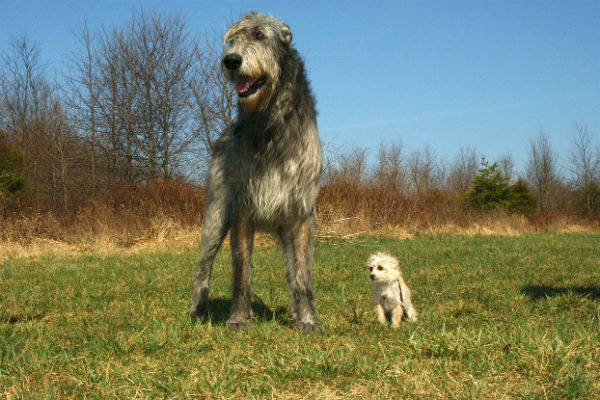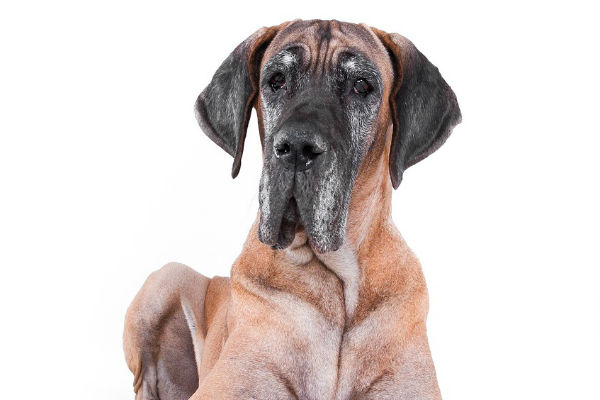what is the average age for a dog to die?
Humans accept much longer lifespans than dogs. This is a bones fact of dog ownership and one that many owners struggle with when the time comes to say bye. While we may wish our dogs could alive forever, knowing how long dogs live helps prepare u.s.a. for their needs as seniors, ensuring that we give them the best possible care throughout their lives so that we go to spend every bit much time with them as possible.
There are several factors that determine the longevity of dogs, including size, brood, and the general health of the animal. These factors tin help answer the questions on nigh dog owner'southward minds: How long practise dogs live? And how can I help my dog live longer?
Do Small Domestic dog Breeds Alive Longer than Large Dog Breeds?

Scientists have long been baffled about why small dog breeds tend to live longer than large dog breeds. In the rest of the creature kingdom, size seems to positively correlate with longevity. Elephants and whales are some of the largest and longest-lived mammals, with some whale species living more than than 100 years. The same cannot be said of dogs.
Pocket-size dogs live significantly longer than their larger counterparts, in many cases up to several years longer. Scientists are not entirely sure why this occurs, although there is speculation that larger dogs develop age-related diseases sooner than smaller dogs. This could be because the larger breeds grow from puppies to adults at an accelerated rate, which may increase the likelihood of abnormal prison cell growth and decease from cancer.
Regardless of the reasons behind why some dogs live longer than others, at that place are similar characteristics amidst small-scale, medium, and big dog breeds that help determine the longevity of each grouping.
How Long Exercise Small Canis familiaris Breeds Live?

The average lifespan for modest dog breeds ranges from 10 to 15 years, with some breeds living equally long equally xviii years. In general, pocket-size dogs live longer than their larger counterparts, with the shortest living breeds nonetheless exceeding the average lifespan of most big breeds. This makes them a good option for owners who desire a long-lived companion. While variability amongst breeders and statistical evidence makes it difficult to determine an exact age range for any breed of dog, here are the boilerplate lifespans of the longest-lived small canis familiaris breeds and the shortest-lived breeds.
Lifespans for certain small canis familiaris breeds:
- Chihuahua (15-17 years)
- Chinese Crested (15-17 years)
- Smooth and Wire Fox Terrier (xiii-15 years)
- English Toy Spaniel (13-15 years)
- Pomeranian (14-16 years)
- Rat Terrier (xiii-15 years)
- Russell Terrier (12-fourteen years)
- Lakeland Terrier (12-14 years)
- Manchester Terrier (12-14 years)
- Yorkshire Terrier (12-fifteen years)
How Long Practise Medium Dog Breeds Alive?

Medium-sized dog breeds range from smaller companion breeds such every bit French Bulldogs, to larger, active working breeds such as Border Collies and Australian Shepherds. The average lifespan for medium-sized canis familiaris breeds is 10 to 13 years, with some breeds living even longer. As with pocket-size dogs, verbal age ranges for medium-sized dog breeds are hard to decide, but there are general lifespan guidelines for each breed.
Lifespans for certain medium dog breeds:
- Australian Shepherd (12-15 years)
- Chinese Shar-Pei (12-fourteen years)
- Cocker Spaniel (thirteen-xv years)
- Poodle (12-15 years)
- Whippet (12-15 years)
- Puli (10-15 years)
- Welsh Springer Spaniel (thirteen-15 years)
- Bulldog (x-12 years)
- Boxer (x-12 years)
- Grub Chow (11-13 years)
- Curly-Coated Retriever (11-xiii years)
- French Bulldog (11-xiii years)
How Long Do Large and Giant Domestic dog Breeds Alive?

The average lifespan for big dog breeds is 8 to 12 years. This includes large breed dogs such as German language Shepherds, Golden Retrievers, Labrador Retrievers, Rottweilers, and Doberman Pinschers, likewise equally giant breeds such as Not bad Danes, St. Bernards, and Mastiffs. In full general, giant breeds tend to live an average of eight to 10 years, whereas large dog breeds live 10 to 12 years.
Lifespans for certain big dog breeds:
- Slap-up Dane (8-ten years)
- Bernese Mountain Domestic dog (vii-10 years)
- Irish Wolfhound (8-10 years)
- Newfoundland (ten-12 years)
- Giant Schnauzer (10-12 years)
- Dogue de Bordeaux (9-11 years)
- Rottweiler (10-12 years)
- St. Bernard (10-12 years)
- Scottish Deerhound (ten-12 years)
- Flat-Coated Retriever (10-12 years)
- Akita (11-15 years)
- Anatolian Shepherd (11-xiii years)
- Irish Setter (12-14 years)
- Belgian Malinois (fourteen-16 years)
The Importance Of Health Testing
In addition to size, genetics oftentimes play a part in determining a dog's longevity. Unfortunately, some dogs are predisposed to certain illnesses, just similar humans. In order to give your canis familiaris the best and longest life possible it is important to be aware of whatsoever health issues your dog'south brood may exist more likely to develop.
When selecting a puppy, make sure you lot choose a responsible breeder who fulfills the wellness exam requirements for their brood. These tests tin can assist detect potentially harmful diseases early in your domestic dog's life.
Common Causes Of Early on Expiry In Dogs
In an ideal earth, all dogs would live out their expected lifespans happily and healthily. Unfortunately, this is not always the case. Early death in dogs less than two years of age is most often associated with trauma, congenital diseases, or infectious causes, co-ordinate to the AVMA, merely trauma, cancer, and infectious disease tin can occur at any time in a dog's life.
Cancer is the leading cause of expiry in large dog breeds across the board. Scientists don't know exactly why larger canis familiaris breeds tend to develop cancer more than frequently than smaller dog breeds.
The exceedingly high rate of cancer in Gilded Retrievers has led to the largest study of cancer in dogs of its kind. Researchers promise that the study will reveal information about why so many Gilded Retrievers suffer from cancer and likewise virtually how the factors that contribute to cancer in dogs could likewise assistance our understanding of cancer in humans.
Cancer symptoms in dogs:
- Lumps
- Wounds that won't heal
- Weight loss
- Enlarged lymph nodes
- Distended abdomen
- Abnormal bleeding
- Lameness
- Swelling
Trauma tin take many forms, including car accidents and domestic dog fights. Puppies and pocket-sized dogs accept higher incidences of trauma-related deaths than adults or larger breeds, and working dogs also have higher incidences of trauma-related deaths. Keeping your dog on a ternion when out of your grand can help foreclose some trauma-related injuries, and it is always a good idea to supervise young puppies around other animals and children.
Congenital and inherited abnormalities are not ever detectable or anticipated. Selecting a responsible breeder and employing responsible convenance practices in your kennel are the best ways to avoid purchasing or producing a dog with a fatal congenital disease.
Infectious diseases are no longer the concern they were prior to vaccines, only they still claim canine victims every year. Keeping your dog up-to-date on parasite control and vaccinations tin help limit your dog's risk of contracting a fatal infectious disease.
Obesity And Longevity In Dogs
Approximately 34 pct of adult dogs in the U.Due south. are overweight or obese. This is alarming considering enquiry suggests that obese dogs live ii years less than dogs at a healthy weight. Obesity puts stress on the musculoskeletal system, leading to osteoarthritis and intervertebral disc disease, and increases their take chances of developing diabetes and pancreatitis. Obesity is also associated with cardiac and respiratory conditions such as airway dysfunction and tracheal plummet. Keeping your dog at a healthy weight reduces the risk of his developing weight-related diseases, improves his quality of life, and gives him a chance to alive out his total life expectancy.
Tips For Longer-Lived Dogs

Predicting the lifespan of your dog is tricky. While it is relatively safe to assume that a small breed dog will outlive a behemothic breed dog, at that place are many factors outside of our control that affect the longevity of our pets. This can exist frustrating, but luckily there are some things we tin can practice to improve the lifespans of our canine companions.
- Feed a salubrious diet
- Maintain a salubrious weight
- Keep upwardly-to-date on vaccines and preventatives
- Know any breed-related diseases and their symptoms
- Schedule regular veterinary checkups and blood piece of work
- Restrict access to toxins and other harmful substances
The best way to assist your canis familiaris alive out his or her life to the fullest is to consult with your veterinarian. Your vet tin can help you lot put together a plan for your dog's well-beingness that includes proper nutrition, preventative care, and exercise, so that your domestic dog stays good for you and active into her golden years.
Source: https://www.akc.org/expert-advice/health/how-long-do-dogs-live/
0 Response to "what is the average age for a dog to die?"
Post a Comment